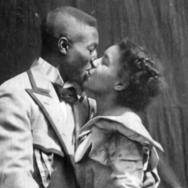Two decades ago, University of Chicago alum Kimberly Peirce created Boys Don’t Cry as a small, indie movie—one the director hoped would help preserve a part of transgender history, even if few ever saw it.
Peirce’s groundbreaking film has far exceeded her original expectations. On Dec. 11, Boys Don’t Cry was inducted into the Library of Congress’ National Film Registry, cementing it as a landmark in American cinema. Based on the life and death of Brandon Teena, the movie was released in 1999 as one of the first empathetic portrayals of a trans person to appear on the big screen.
“Twenty years later, it still feels like a miracle Boys Don’t Cry got made,” said Peirce, AB’90. “I fell in love with Brandon Teena the moment I discovered his story and learned of his desire to live and love as himself in a time and place where that was impossible. I felt a powerful conviction to bring Brandon to life on screen, so audiences would love him as I did and share my horror at his rape and murder.

“To our amazement, the rest of the world embraced Brandon. It is meaningful to me as a filmmaker, as a genderqueer, and simply as a person that the Library of Congress has recognized Boys Don’t Cry. This moment is a culmination, unimaginable and wonderful.”
Boys Don’t Cry is one of 25 films chosen this year for the registry, joining such movies as Purple Rain and Clerks. Peirce’s directorial debut exists in part because of her time at UChicago: The Hyde Park campus was where she realized her talent and desire to make films, inspired by Prof. Lauren Berlant, who remains a close mentor and friend.
The rigorous approach she learned at UChicago, Peirce said, shaped her filmmaking process. After reading headlines about Brandon Teena’s death as a graduate student at Columbia University, she decided to travel to the murder trial in Falls City, Nebraska—accompanying a group of activists known as Transexual Menace.
There, Peirce collected hundreds of thousands of pages of court transcripts, and interviewed those who knew Teena while he was alive. Those materials—along with audition tapes that included trans and non-binary actors—will be preserved by the Academy of Motion Picture Arts and Sciences, giving future generations access to a significant chapter in queer history.
“For me, telling a version of Brandon’s story meant learning everything I could about him—who he was, who he might have been, what he might have wanted and needed, and how he went about getting it,” Peirce said.
She described her relationship to Boys Don’t Cry as that of an “adoptive parent”—one who saw the film as a way to remember someone “who had been deeply misunderstood, in a way that people could understand and connect with him.”
“Twenty years later, it still feels like a miracle ‘Boys Don’t Cry’ got made.”
Boys, which won Hilary Swank an Oscar for her role as Brandon, has been screened across the country this year as part of a 20th anniversary tour. Peirce has other appearances planned in the next few months, but the most meaningful date on the calendar was her visit to the University of Chicago in November.
Organized by the Film Studies Center, the on-campus screening of Boys Don’t Cry was followed by a discussion with Peirce and a panel of UChicago scholars, including Berlant, the George M. Pullman Distinguished Service Professor in English. The talk touched not only on the specifics of the filmmaking process, but on how queer and trans culture have shifted in the past two decades.
“This has been so moving and so important to me,” Peirce said at the end of the November event. “I love this movie, because I really love Brandon. The idea that all of you are enjoying it, it means so much to me.”









